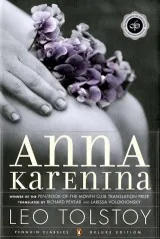Adventures of Huckleberry F...
Mark Twain’s The Adventures of Huckleberry Fi...
By Susan Giles1043

0

Count Lev Nikolayevich Tolstoy, or Leo Tolstoy as often referred to in English, was and still is one of the greatest authors in history. The holy grails of his work are War and Peace, which is heavily loaded with many characters and Anna Karenina.
When you think of Tolstoy, it’s impossible to define his evolved brilliant writing style or tame it under a certain category. The great Russian novelist might have annoyed many readers with his complex unique style, but what we can all agree on is that he was a genius.
While in War and Peace, he started by overwhelming the reader with many characters, yet he still managed to create unity and harmony between them after the first 100 pages.
After setting his tone, he then goes and completely changes it in Anne Karenina. In this story, he focused on one tormented soul to study its depth on a psychological level. He managed to pull a great Balzac and a Flaubert in just two novels.
Right off the bat, Anne Karenina might seem like another romantic novel with its straightforward seemingly plain writing style. However, when you begin to immerse yourself in the novel and its many deep interior dialogues, it becomes clearer why historians classified it as a psychological novel that bridged between realism and modernism.
The basic structure might fool you, but upon reading and rereading the novel, it begins showing its amorphic nature. Tolstoy is not the type of novelist that tries too hard until the novel is heavily mined with metaphors. Tolstoy was the type to show and tell; he chose his words with extreme carefulness to convey the exact meaning he intended.
The narration in his masterpiece, Anna Karenina, is seemingly unique from any other novel. Instead of forming a certain voice, the narrator continues to get heavily involved without any justification for his role. Even when you cross an interior dialogue inside a character’s head, the narrator doesn’t take a rest. You will be faced with phrases such as “she thought to herself” or “he felt”.
The beauty of the novel starts to reveal itself when every thought, move, or gesture is recorded through the narrator. Even in the most intimate passages between the hopeless romantic Anna and her lover Vronsky, the narrator is hiding in the back to explain every misunderstanding between them and every emotion they are trying to hide from each other.
This third entity presence doesn’t steal the light from any of the characters or interfere in their lines of thought. He just records without any judgment or interference.
If you are an avid reader of Tolstoy, you will come to notice that throughout his novels, never once there has been a clear description of urban buildings, even after being hit with the realization that the majority of his novels usually take place either in Moscow or St. Petersburg.
On the other hand, in Anna Karenina, you will come across the most beautiful, intricate, and exquisite details of the countryside. Tolstoy showed his deep hatred for cities and their static artificial nature throughout his books, but when it came to the countryside in Anna Karenina, you find yourself almost drowning and getting lost in the way he painted his words about the liveliness of the countryside.
At a certain point in the middle of the novel, it all starts to make sense. At this point, you begin to understand Tolstoy and how he mastered time, language, and space. He effortlessly manipulated all three until they came together to show his epic style.
Tolstoy’s uncertainty is shown obviously in this novel regarding his torn feelings between love, lust, self-denial, and moral rigor. Through these contradictions, Tolstoy’s unparalleled talent seeps through the cracks of his mastery of time and his slavery to the truth. Giving anything less than a 9 out of 10 for this masterpiece would be a crime I’m not willing to commit.
Updated 4 years ago